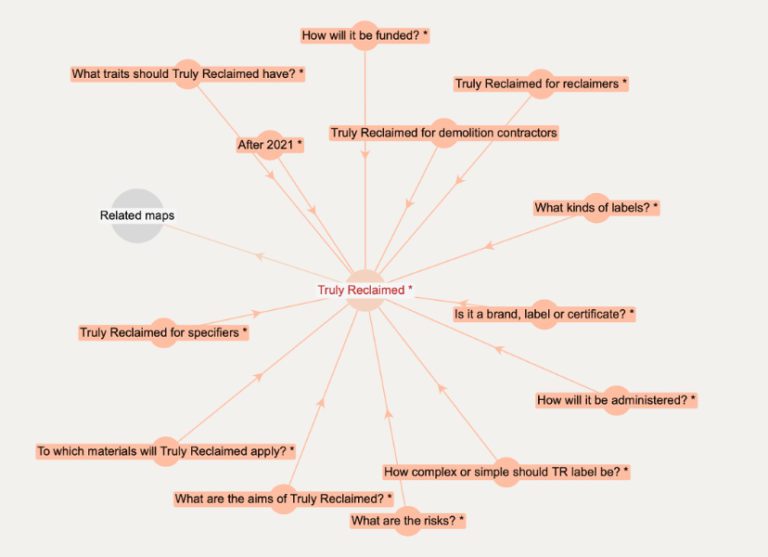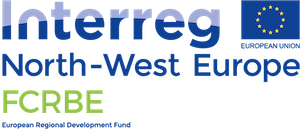Truly Reclaimed development process
Conflicts of Interest
Salvo Ltd has rules to take appropriate steps to ensure that neither Salvo Ltd nor any staff is placed in a position where there is or may be an actual conflict, or a potential conflict, between the pecuniary or personal interests of Salvo Ltd and the duties owed to funders under the provisions of a funding contract. Salvo Ltd will disclose to funders full particulars of any such conflict of interest which may arise.
Funding
1993-95: The development of the Salvo Code was self-funded by Salvo. Attendees at committee meetings were voluntary unpaid. Proof-readers and other contributors were also unpaid.
2015-16: Innovate UKRI UK government co-funded 70%, with Salvo’s input of 30%, of the Truly Reclaimed feasibility study. Attendees at meetings were voluntary unpaid. Proof-readers and other contributors were also unpaid.
2019-21: EU Interreg co-funded 70%, with Salvo’s input of 30%, of the FCRBE project which included the beta-launch of the Truly Reclaimed standard. Interreg’s funding rules disallow COI and Salvo’s accounts during this period were verified by a third party accountant directly to the lead partner in Brussels, and by them to Interreg in Lille. Attendees at consultation meetings and workshops were voluntary unpaid.
1991-2023: All other development costs from 1991-2023 were met by Salvo Ltd – a for-profit business, founded by a woman, and woman-led and owned since 2022.
Transparency of participation procedures
The free online monthly SalvoNEWS (est 1992) has a subscriber circulation of 4,500 drawn from all sectors – private consumers, established reclamation dealers, mainstream construction, architects designers, green construction and heritage groups. Continual calls have been made in print, online, at trade and consumer exhibitions, during visits by Salvo to the trade, for member input, stakeholders from construction, and consumer interest throughout Salvo’s history.
Two examples of SalvoNEWS

Also see the Truly Reclaimed debategraph which was publicised and viewed by stakeholders and contributed to by some.
Attestation
Thornton Kay of Salvo attests that potential stakeholders from construction and reuse institutions and companies, individual consumers and consumer interest groups were invited to comment and contribute in UK, Ireland, USA and Europe, from 1996 onwards on the Salvo Code and from 2015 onwards on the Truly Reclaimed standard. Changes to the Salvo Code and Truly Reclaimed standard were then made by Salvo after consultation and approval of the ad-hoc reclamation trade stakeholder committee.
Announcements

Salvo Code
1. 1993: UK outreach regarding a voluntary code of conduct for good business practice in reclamation stock purchasing made to established dealers, and to UK government listed building bodies which had recommended this course of action. Announcements made in SalvoNEWS (printed) circulated to the reclamation sector, institutions, heritage organisations, green building organisations.
2. 1993: UK code steering committee formed
3. 1994: draft proposals circulated to stakeholders and others for comment
4. 1995: code agreed by voluntary consensus of all (no adverse comment)
5. 1995: Salvo Code for UK and international reclamation businesses agreed and around 100 dealers signed up to become members in UK, Europe, U.S. and Canada
Truly Reclaimed standard
2015: Additional Truly Reclaimed standard conceived by Salvo, for Salvo Code members to make additional declaration to verify that specific objects are genuinely reclaimed. Main stakeholders are existing Salvo Code members and UK Building Research Establishment. Outreach to global dealers through SalvoNEWS and UK construction and standards institutions. The main purpose was to see how much support there was for some kind of standard.
2016: Feasibility study published and circulated. Stakeholder group was consulted of 90 existing Salvo Code members. Ad-hoc stakeholder committee of 4 UK and 1 French business formed. See the full report here.
2019-21: Salvo was contacted by interested bodies in Belgium and France about the Truly Reclaimed standard. EU ‘FCRBE’ reclamation research project partners agreed including Salvo, Rotor (reclamation business Brussels) and Bellastock (reclamation business Paris), plus five major building institutions in UK, Ireland, France and Belgium. Further consultations took place with the UK and French reclamation trades, as well as the project partners. A large report was published and presented in Brussels in November 2021, followed by the ‘beta’ trial launch of the Truly Reclaimed standard in the UK and France. The full standard and Salvo’s report proposed ‘Reclaimed Product Declarations’ (analogous to new construction material ‘Environmental Product Declarations’) and ‘Reclamation Category Rules’ (analogous to new construction material ‘Product Category Rules’) were announced. The ‘Truly Reclaimed’ standard is a self-declaration made by a reclamation business that an object is truly reclaimed. The ‘Reclaimed Product Declaration’ contains values for avoided carbon emissions, provided by Salvo, based on the UK ‘Inventory of Carbon and Energy’ construction material embodied carbon database originally produced by Jones & Hammond at Bath University (now maintained by C Jones of Circular Ecology). See the full ‘Yours Truly Reclaimed’ report here.
2022: Three reclamation businesses (two UK, one French) have launched a range of reclaimed building material and products available to buy under the Truly Reclaimed standard. See for example BCA Matériaux Anciens in France: general info page and product page.
2023: The Truly Reclaimed standard is planned to be rolled out to stockholding reclamation businesses including U.S. deconstructors, and for making samesite declaration of reuse by architects, specifiers, and other reclamation and reuse actors.
2024: Salvo aims to present the scheme at the ‘Deconstruction + Reuse’ annual conference held by BuildReuse in Savannah GA in February 2024.
Membership of decision-making bodies
Salvo Code membership
The membership (currently 88) peer review new applications, agree clause amendments, and adjudicate on appeals. The principal operators of the Salvo Code and Truly Reclaimed standard are the stockholding reclamation dealer membership which averaged 120 dealer members during the development, located mainly in the UK, with some in Europe and North America. The draft proposals, draft clauses and final clauses of the Salvo Code and Truly Reclaimed standard were put to the membership annually, and throughout the course of a year, as necessary, for their consideration. Every suggested alteration or amendment was circulated for further comment, and voluntary consensus was always agreed.
Timeline
1993: Prior to the launch of the Salvo Code a steering committee of the UK’s largest and longest established specialist dealers was formed by Salvo, with co-opted members from Sotheby’s, Christie’s and English Heritage. The Code was formally agreed upon in 1995 and launched by Salvo, and 20 established stockholding dealer businesses were invited to join.
1995 onwards: All applications to join the Salvo Code were circulated to all members for peer review and comment on probity. Adverse probity comments resulted in an investigation by the Salvo Code administrator, who made the final decision on the acceptance of members, and rarely, alleged transgressions of the Salvo Code itself. This occasionally resulted in changes to the wording of clauses, which were circulated to all for approval and which were occasionally rejected.
From 2014-18: A membership committee – the Salvo Code Application Network – was tested for making the final decision regarding membership, but was abandoned due to a lack of interest. In one instance, in 1997, a member was expelled from the Salvo Code for transgressing the code, and the proposed action was circulated to all members for their final agreement.
2019-21: In 2021 Salvo applied for a certification trademark for the Truly Reclaimed standard, which contained the rules that included a formal dispute resolution process. The 2022 Truly Reclaimed standard rules are currently (Dec 2022) under review by the UK government Intellectual Property Office.
UK and EU funding partner committees (disbanded)
The research and development of the standard were discussed by team members of the project funding partners, whose suggestions under the partnership agreement (see Article 4 below) were noted and put to the Salvo members for their consensus view. The partners included:
Buildwise (Belgium)
Bellastock (France)
Brussels Environment (Belgium)
Embuild (Belgium)
CSTB (France)
Interreg NWE (France)
Rotor DB (Belgium)
Article 4: Decision-making under the partnership agreement 1. To ensure an effective follow-up of the project, a steering committee will be set up (at the latest at the kick-off meeting). The steering committee will be in charge of keeping a constant overview of all the ongoing activities. The composition of the committee ensures at least one representative from each partner involved in the project. At minima, it will be composed by at least one representative for each partner involved in the project. The steering committee members have to be present at the meetings; they may appoint a substitute or a proxy to attend and vote at any meeting; and will commit to participate in the meetings collaboratively. The committee will meet regularly and will be appointed to make decisions on the following issues:
2. Decisions with regard to the following:
– General project activities will be taken by an unanimous agreement of the partners of the project, following a one-project partner-one-voice principle.
– Activities within each Work Package (WP) will be taken by the partners in charge of said activities, with the agreement of the concerned WP’s leader and the lead partner, warrant of the respect of the overall philosophy of the project.
– The budget of each WP will be taken by the partners in charge of said WP, with the agreement of the concerned WP’s leaders and the lead partner, warrant of the respect of the overall philosophy of the project.
– Request for the exclusion and addition of partners will be taken by a 6/8 majority of all the partners of the project, following a one-partner-one-voice principle.
3. For decisions that can not be settled by unanimous consensus of all the partners, a simple majority vote can be proposed by any partner. If no majority can be settled, an additional voice is given to the lead partner to settle the decision.
Other contributors:
2019-21: A list of 120 contributors can be seen on pp75-78 of the ‘Yours Truly Reclaimed’ report accessible here.
2015-16: The main UK contributors for the feasibility study were FSC, Grown in Britain, NFDC, and NHBC. More are listed throughout the ‘Truly Reclaimed Wood’ report, which can be accessed here.
Procedures: Thornton Kay, Salvo Code and Truly Reclaimed manager 1993-2022, attests that the procedures outlined above were adhered to.
Balance of interests
The outreach by Salvo and its Truly Reclaimed research project partners was extended to more than 5,000 institutions, businesses and individuals in total, in 2015-16 to a small group of UK institutions and organisations for the feasibility study, then to a larger, more diverse and balanced group in UK, Ireland, France and Belgium, for the beta-launch in 2019-21. During both periods, a number of actors in the reclamation trade were also consulted on evolving aspects of the Truly Reclaimed standard.
Institutions and organisations (some representing a membership of hundreds or thousands of people or businesses, each counted here as one group) were contacted and invited to participate. Most were self-selected as a result of general outreach.
The list of consultees shows the following types of interest groups and individual businesses and consumers, aligned with the EPA’s balance of interests requirement.
- Salvo members and other dealers – total 61 – 52% (representing themselves)
- Consumers – total 29 – 24% (some organisations represented more people)
- Specifiers – total 29 – 24% (some organisations represented more people)
Lack of dominance
Attestation: Thornton Kay of Salvo attests that there were no complaints at any time about the dominance of interests in the consultation process.
Timely notices to participate
A schedule of notifications is published. A minimum of 30 days is given for comment periods.
Timely notices to participate in decision-making bodies
A schedule of notifications is published. A minimum of 30 days is given for comment periods.
Consideration of interested party input
Comments made by interested parties were discussed by the steering committee of the Salvo Code, and the research partners for the Truly Reclaimed standard and decisions on both were reached by consensus.
Sample comment: In 1994 a UK heritage body suggested that the Salvo Code should prohibit cash dealing by members and require all payments to be paper or card transactions made by cheque or bank payment cards so that a traceable record was kept. The consensus of the Salvo Code steering group and other dealers who responded was unanimous not to agree. Dealers objected due to traditional cash transactions made at international trade fairs and markets where (in those days) the only secure payment was to pay in cash. (This ‘cash’ exclusion was subsequently limited by the UK anti-money laundering regulations, which placed limits on cash transactions, and has more recently shifted to digital transactions being regularly made in the middle of fields using mobile phones. Some people still preferred cash deals, and the issue of not allowing this minority in the Salvo Code has not been raised since.)
Policies for patented technology and intellectual property
Salvo does not hold any patents. IP in the Salvo Code and the Truly Reclaimed standard is in the form of a certification trademark which has been applied for in the UK, and will be elsewhere, including the USA. The rules give a licence for a member to use the Truly Reclaimed trademark on products which it has self-declared to be Truly Reclaimed. A record of each public declaration is kept in perpetuity on the Truly Reclaimed website even if that member ceases trading, so that further reuse can be declared and recorded.
Consensus effort
Salvo has had 30 years experience of operating by consensus. We maintain contact with the membership through our monthly newsletters, trade fairs, visits to dealers by Salvo staff, consultations and surveys. Usually, Salvo seeks to achieve unanimous agreement or at least a substantial majority to create an acceptable consensus view.
Technical / substantive comments
So far in the past 30 years, no technical or substantive comment requiring adjudication outside the existing membership has been received.
Procedural appeals mechanisms
Dispute resolution – Nothing in the terms of the Salvo Code or Truly Reclaimed scheme rules shall affect the legal rights or obligations of any party to a dispute. Disputes between members, or by a member with Salvo, or between other parties, will be determined by Salvo, following which an appeal may be made which will be adjudicated by a committee of three or five members whose decision will be final. A complaint made to Salvo, where a response may be expected, will be responded to by Salvo and appeals against that decision will be determined by a committee of three or five Salvo members whose decision will be final. The result of a dispute or complaint may be a temporary member suspension, a termination by a member resigning or an irrevocable withdrawal of membership by Salvo. In the normal course of events, a complaint by a party wishing to remain anonymous may not be considered or acted upon.
Procedural appeals mechanism – The first recourse would be to determine the appeal as a kind of dispute resolution (as above). If the technical or other competence of members is questioned, an ad hoc tribunal will be convened of at least three people familiar with the competence needed and acceptable to both parties to the dispute. The majority decision of the tribunal would then be put to the dispute resolution test (as above) for confirmation or rejection. In the event the tribunal’s judgment is rejected, an extraordinary meeting of the Salvo membership shall be convened, and the rejection or acceptance will either be confirmed or rejected by the majority vote (one vote per member), which decision shall be final.
Publicly available criteria
The URLs to webpages that will contain the criteria, and will be free and publicly available, are:


